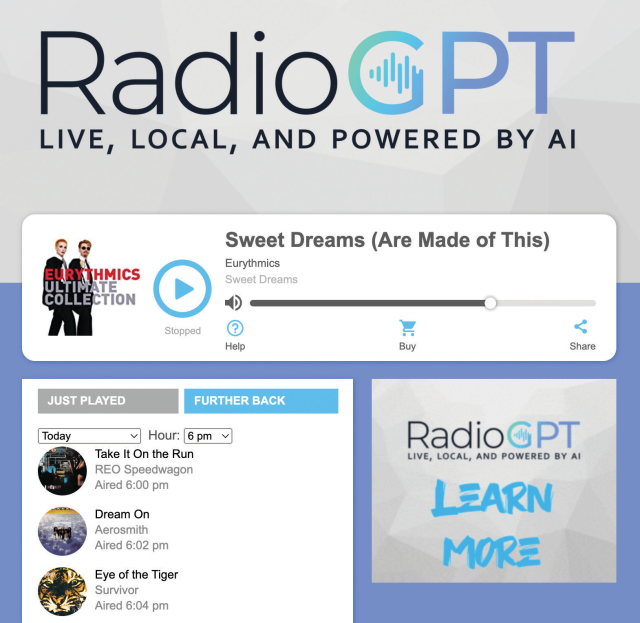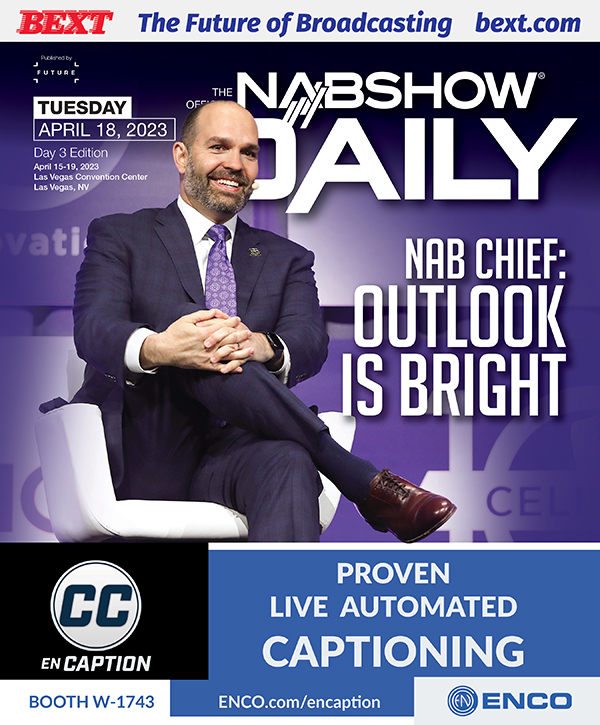
Futuristic capabilities of this disruptive technology raise expectations and job fears
BY Paul mcLane, RadIo world
Radio industry talk has focused on the many ways artificial intelligence might make work more efficient — or take away jobs. AI already was used in radio, but generational platforms like ChatGPT have accelerated debate. Expect to hear a lot more here at NAB Show.
Futuri is here with RadioGPT, which creates “the world’s first 100 percent AI-driven radio hosts.” It combines GPT-3, voice tech and a story discovery/social content system. It scans social media and a quarter-million other sources of information to identify topics trending in a market. It uses AI to create a script for on-air use, and then puts AI voices to it.
U.S. company Alpha Media is intrigued; Executive Vice President of Content Phil Becker said the company is “conceptualizing use cases” but hasn’t deployed it.
In Canada, Rogers Sports & Media is dabbling.
Futuri says stations can even create single-, duo- or trio-hosted shows, or train the software with voices of existing personalities, in any format.
Promises like this have a lot of radio people worried that AI will be a job-killer.
But CEO Daniel Anstandig calls it playing to radio’s strengths: “The ability for broadcasters to use RadioGPT to localize their on-air content in a turnkey fashion opens up resources for them to deepen their important home-field advantages in new and unique ways. …
With RadioGPT, there should never be a ‘liner card’ or ‘sweeper-only’ air shift again. Now everyone can be live and local.”
Exhibitor Veritone makes products to create avatars and synthetic voice models, deploying AI “to bring digital personas to life.” Clients include iHeartMedia, Audacy and ESPN.
“Radio managers need to be thinking about which technologies to embrace and lean into,” said Sean King, Veritone senior vice president and general manager, Commercial Enterprise, “whether that’s synthetic media or automation tools to ensure their organizations are around for the next NAB Show.
“Everyone in this space needs to learn not only how to keep up with content demands and new platforms but how to reach new audiences while remaining authentic to their programs’ values
and brand.”
What about a risk to jobs? “I think about farming,” King said. “Advances in equipment didn’t put farmers out of business, it made them more efficient. Now, many successful farms utilize AI to analyze weather patterns, make predictions and optimize their crop growth.
“AI provides great insight… Take attribution and proof of performance. Without real data, stations and advertisers are merely guessing at what’s working,” said King. “Without AI, it can take a long time to sift through content archives to find a needed clip. With AI, it can be done in mere seconds.” With synthetic voice, creators can use their voice “in two or more places at once.
Additionally, they can do this in multiple languages,” opening new markets. ENCO Systems already uses AI for automated captioning. At NAB Show, it’s showing two offerings that use ChatGPT.
AITrack integrates with DAD automation to generate voice tracks between songs. “That might include identifying the song and artist of the previous song, introducing the next song and artist, or communicating station IDs, and news or weather updates,” President Ken Frommert said.
Meanwhile ENCO-GPT will automatically create ad copy and summarize news stories. “The application will summarize a written news article into a few sentences or inject breaking news updates into a body of a break. This technology can also be used to quickly write copy for both sponsorships and advertising and convert it to synthetic speech.”
Frommert said AI is still emerging. “It will take time to reach the quality and accuracy levels that the broadcast industry requires and expects. One concern to alleviate is that AI will make everyone’s job obsolete. Like automation before it, AI will change operational models and perhaps disrupt some traditional structures, but AI cannot survive in broadcast alone. That human element will always be required for quality assurance.”
And not all AI applications are “generational.” Exhibitor WorldCast Systems deploys an AI system called SmartFM for Ecreso transmitters. It says the technology, sold via software license, enables reductions of energy consumption by up to 40%.
Director of Marketing Communications Chantal Fourgeaud said the AI qualifies the robustness of audio content; when the signal is robust enough, it adjusts transmitter power, with no impact on program coverage and audio quality. She said this dynamic RF power approach saves electricity, produces less carbon dioxide and improves service life. The system is in numerous markets, but the biggest is Germany, where approximately 800 transmitters are equipped with it.


